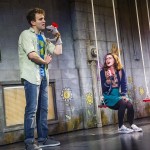Robert Tanitch reviews Kindertransport at Richmond Theatre, Surrey
2013/2014 marks the 75th anniversary of Kindertransport. Andrew Hall’s revival of Diane Samuels’ drama, originally premiered in 1993 and regularly studied in schools, is playing its part in a communal act of remembrance.
Between 1938 and the outbreak of World War 2 in 1939, 10,000 Jewish children, aged between 5 and 17 arrived in Britain from Germany, Austria, Poland and Czechoslovakia, refugees from Nazi persecution, seeking asylum. Most of them never saw their parents again. No Jewish adults were allowed to travel with them. Of the children, who failed to get away, 1.5 million were killed in the holocaust.
Diane Samuels traces what happens to Eva, a 9-year-old girl, who changes her name to Evelyn and rejects her Jewish faith and culture. She becomes a British citizen. The characters are fictional but most of what happens on stage happened to different children in real life. Past and present are inextricably linked and acted out simultaneously.
Kindertransport might work even better as the basis for a television film. The play is about the pain of separation of parent and child and the guilt of survival when so many others have died. It may well be thought that the best thing to do is to put the past behind you and to start afresh. But best for whom? The child? The parent? The foster-parent who adopts the child?
It is difficult not to be moved when after the war has ended the grown-up Evelyn (Janet Dibley) rejects her mother (Emma Deegan) who had survived Auschwitz, preferring to stay in England with her adoptive mother (Paula Wilcox).
The production will be visiting Southend, Eastbourne, Guildford, Malvern, Mold and Manchester. It is to be hoped that as many schools as possible will take children to see it.
Diane Samuels has also written a guide to the play. Published by Nick Hern Books it is essential reading for anyone studying, teaching or performing the play.
To learn more about Robert Tanitch and his reviews, click here to go to his website





